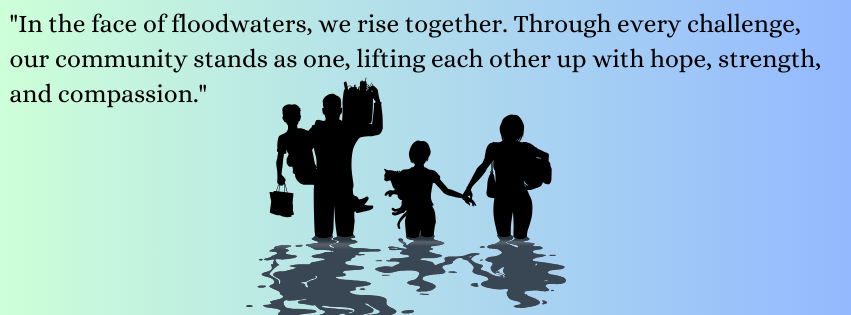Recovering from Disaster: Coping with Trauma and Stress After the Recent Flooding
The past few days have been devastating for many in Eastern Kentucky and surrounding areas. The flooding has taken homes, businesses, and a sense of stability, leaving families to navigate loss, uncertainty, and overwhelming stress. While the physical damage is evident, the emotional and mental toll of a disaster like this can be just as profound—sometimes even more so.
As we move forward in the coming days, it’s important to acknowledge the emotional impact of what’s happened. Trauma doesn’t always appear right away; it can build over time, showing up as anxiety, depression, nightmares, or even numbness.
Whether you were directly affected or are helping loved ones through this crisis, here are some key things to keep in mind:
1. Acknowledge Your Feelings
It’s okay to grieve, feel angry, or experience fear about the future. Disasters disrupt our sense of safety, and it’s natural to feel unsettled. Don’t push your emotions aside—recognizing them is the first step to healing.
2. Take Things One Day at a Time
Recovery is overwhelming. Instead of trying to process everything at once, focus on small, manageable steps. Prioritize safety, basic needs, and support systems. Allow yourself breaks and avoid overloading your mind with “what-ifs.”
3. Lean on Your Support System
You don’t have to go through this alone. Talk to family, friends, neighbors, or faith communities. Even a short conversation with someone who understands can provide relief. If you’re struggling, reaching out for professional help can be a critical step in coping.
4. Be Aware of Trauma Responses
In the days and weeks ahead, you may notice signs of stress and trauma, including:
• Trouble sleeping or nightmares
• Feeling on edge or constantly alert
• Flashbacks or intrusive thoughts
• Avoidance of reminders of the flood
• Increased anxiety or sadness
If these feelings persist, they may be signs of acute stress and could lead to post-traumatic stress; remember that support is available to help you process and heal.
5. Take Care of Your Body and Mind
While it may feel impossible to focus on anything beyond survival, simple acts of self-care—eating nutritious meals, staying hydrated, getting rest when possible—can make a big difference. Mindfulness, deep breathing, or even short walks (if safe) can help regulate stress.
6. Help Others When You Can—But Set Boundaries
Eastern Kentucky is known for its resilience and strong sense of community. Many of us feel compelled to help in any way we can. Supporting others is valuable, but don’t neglect your own well-being. You can’t pour from an empty cup—allow yourself time to recover, too.
7. Seek Professional Support if Needed
If you find yourself struggling to cope, therapy can be a powerful tool. Talking with a counselor can help process the emotional weight of this disaster, provide coping strategies, and offer a space to grieve and rebuild emotionally.
Resources for Recovery
During times of crisis, it’s often the collective effort of many that brings hope and relief to those affected. Eastern Kentucky has shown incredible resilience, and numerous organizations, businesses, and individuals are stepping up to provide support in this difficult time. Whether through donations, volunteering, or direct aid on the ground, help is available.
Here are some key resources and organizations offering assistance in the wake of the recent flooding:
EKY Mutual Aid: A grassroots organization dedicated to mutual support, providing resources and supplies to those in need. They are actively coordinating donations and distributing essential items to impacted communities.
Lex18: Local news outlet Lex18 is providing updates and information on the ongoing recovery efforts. They are also sharing crucial resources for those affected, including shelters and relief centers.
East KY Dream Center: A beacon of hope for many in the region, this organization is offering supplies, clothing, and other needed supplies, helping people rebuild not only their homes but their lives.
Pikeville YMCA: The Pikeville YMCA is stepping up to provide emergency services such as food, shelter, and essential hygiene needs for those affected by the flooding.
Public Schools in the Counties: Local schools are serving as vital hubs for relief efforts, providing food, supplies, and temporary shelter for displaced families.
In addition to these organizations, first responders, countless volunteers, businesses, and local residents are contributing to the recovery in any way they can. Whether you are in need or looking for ways to help, these resources are a great starting point for assistance.
We encourage everyone to reach out to these organizations, donate if possible, or lend a hand where it’s needed. Together, we will rebuild, recover, and continue to support each other through these challenging times.
At Counseling in the Holler, we are here for our community. If you need support in the days ahead, don’t hesitate to reach out. You are not alone in this—together, we will rebuild, heal, and find our strength again.
Stay safe, take care of each other, and know that brighter days are ahead.














